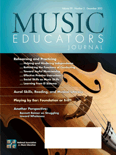
MUSIC EDUCATORS JOURNAL
Scope & Guideline
Cultivating Excellence in Music Education Research
Introduction
Aims and Scopes
- Equity and Inclusion in Music Education:
The journal emphasizes the importance of equity and inclusion, exploring ways to dismantle systemic barriers and promote diverse voices within music education. - Integration of Technology in Music Learning:
A significant focus on how technology can enhance music education, including virtual instruments and digital audio workstations, is prevalent throughout the journal's publications. - Culturally Responsive Teaching Practices:
The journal promotes culturally sustaining pedagogy, encouraging educators to adapt their teaching strategies to reflect the diverse cultural backgrounds of their students. - Professional Development and Community Engagement:
Articles often discuss the importance of building professional learning communities among music educators and engaging with families and communities to support music education. - Innovative Pedagogical Approaches:
The journal highlights new methodologies and frameworks for teaching music, including modern band practices, improvisation, and social-emotional learning strategies.
Trending and Emerging
- Social Justice and Anti-Racism in Music Education:
A growing number of articles address social justice issues, advocating for anti-racist practices and the inclusion of marginalized voices in music education. - Mental Health and Wellness for Music Educators and Students:
There is an increasing focus on the mental health and well-being of music educators and students, emphasizing the importance of supportive environments and self-care strategies. - Community and Family Engagement:
The journal is trending towards exploring ways to engage families and communities in music education, fostering partnerships that enhance student learning experiences. - Interdisciplinary Approaches to Music Education:
Emerging themes include the integration of arts with other disciplines, such as STEM/STEAM initiatives, to create holistic educational experiences. - Innovative Assessment Practices:
There is a rising interest in developing innovative assessment strategies that prioritize student growth and creativity over traditional grading systems.
Declining or Waning
- Traditional Classical Music Pedagogy:
There has been a noticeable decline in articles focused solely on traditional classical music pedagogy, as the journal increasingly emphasizes diverse musical genres and contemporary practices. - Standardized Assessment Practices:
Discussions around rigid standardized assessment methods have decreased, indicating a shift towards more holistic and formative approaches to student evaluation in music education. - Historical Perspectives on Music Education:
While historical contexts remain important, there has been less emphasis on purely historical analyses of music education, with a preference for contemporary relevance and applications. - Teacher-Centered Instruction:
Themes centered around traditional, teacher-centered instructional methods have diminished, as the focus shifts towards student agency and collaborative learning environments. - Prescriptive Repertoire Lists:
The reliance on prescriptive repertoire lists for music education appears to be declining, giving way to more flexible and student-driven repertoire selection processes.
Similar Journals

BULLETIN OF THE COUNCIL FOR RESEARCH IN MUSIC EDUCATION
Pioneering Research for Progressive Music TeachingBULLETIN OF THE COUNCIL FOR RESEARCH IN MUSIC EDUCATION, published by UNIV ILLINOIS PRESS, is a premier scholarly journal dedicated to advancing the field of music education through rigorous research and critical discourse. With an ISSN of 0010-9894 and E-ISSN 2162-7223, this journal plays a significant role in disseminating innovative findings and educational practices, ranking in Q1 for Music and Q2 for Education as of 2023. The journal's esteemed position is further highlighted by its Scopus ranking, placing it in the 80th percentile among music-related publications. Covering a time span from 2002 to 2024, it serves as a vital resource for educators, researchers, and graduate students alike. Although the journal does not currently offer open access, its contributions remain crucial in shaping music education research and practice. The BULLETIN not only inspires scholarly inquiry but also enhances the discourse surrounding effective music education methodologies.
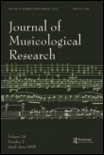
JOURNAL OF MUSICOLOGICAL RESEARCH
Exploring the Depths of Musical ScholarshipJOURNAL OF MUSICOLOGICAL RESEARCH, published by Taylor & Francis Ltd, is an esteemed platform that delves into the field of musicology, contributing to the ongoing dialogue in music research and scholarship since its establishment in 1979. With an ISSN of 0141-1896 and an E-ISSN of 1547-7304, this journal serves as a vital resource for researchers, professionals, and students, offering insights into diverse musicological topics. Although currently categorized in Q4 in Music with Scopus rankings placing it at #110 out of 180 in the Arts and Humanities field, its commitment to excellence and broader discourses in music studies is evident. The journal does not have Open Access options, yet it provides accessible content through reputable academic channels, fostering scholarly exchanges within the community. It aims to publish high-quality research that advances understanding of musical practices and cultural implications, making it a critical resource for those passionate about music and its myriad influences.
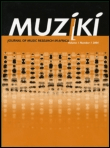
Muziki-Journal of Music Research in Africa
Exploring the Rhythms of Africa's Musical HeritageMuziki - Journal of Music Research in Africa is a leading publication dedicated to exploring the rich tapestry of music research across the African continent. Published by Routledge Journals, Taylor & Francis Ltd, this journal has been at the forefront of scholarly discourse since its inception in 2004, providing a platform for innovative and interdisciplinary approaches to the study of music. With an ISSN of 1812-5980 and E-ISSN of 1753-593X, it ensures wide accessibility to both print and digital audiences. As of 2023, it holds a prestigious Q3 ranking in the field of Music, reflecting its commitment to quality scholarship and the promotion of diverse musical narratives. Muziki is particularly invaluable for researchers, professionals, and students seeking to deepen their understanding of African musicology and its socio-cultural relevance. The journal publishes original research articles, reviews, and critical essays, highlighting contemporary developments and historical contexts in music research. With a Scopus rank of 59/180 in the Arts and Humanities Music category, it stands as a respected source for advancing knowledge and fostering dialogue within the global music community.
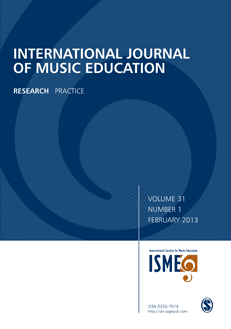
International Journal of Music Education
Unveiling new pathways in music teaching and learning.The International Journal of Music Education is a premier academic platform published by SAGE Publications Ltd, dedicated to exploring the interdisciplinary intersections of music and education. With its ISSN 0255-7614 and E-ISSN 1744-795X, this esteemed journal has been contributing significantly to the field since 1996 and will continue to do so through 2024, underscoring its commitment to advancing scholarly discourse in music pedagogy. It boasts impressive ranking metrics, including Q1 status in Music and Q2 in Education as of 2023, reflecting its influence within these domains. Ranked #10 out of 180 in Music (94th percentile) and #501 out of 1543 in Education (67th percentile) by Scopus, the journal is acknowledged for its rigorous peer-reviewed articles that address contemporary issues, innovative teaching strategies, and the role of music in learning environments. Although it does not offer open access, researchers, professionals, and students are encouraged to engage with its comprehensive research findings, ensuring the advancement of both music education and the broader arts landscape.
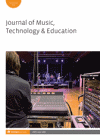
Journal of Music Technology & Education
Unleashing creativity at the intersection of music and tech.Welcome to the Journal of Music Technology & Education, a leading academic journal dedicated to the intersection of music, technology, and pedagogical practices. Published by INTELLECT LTD in the United Kingdom, this journal has gained considerable recognition within the scholarly community, particularly noted for its strong rankings across multiple disciplines. As of 2023, it holds a prestigious Q1 quartile position in Music, Q2 in Education, and Q3 in Computer Science Applications, highlighting its multifaceted impact on various fields. Spanning over a decade from 2012 to 2023, the journal features rigorous peer-reviewed articles that explore innovative approaches to music education, technology integration in teaching practices, and advancements in digital music creation. Researchers, educators, and students alike will find valuable insights and cutting-edge research to keep them at the forefront of this rapidly evolving landscape. Access to the journal's content is available to a broad audience, making it a vital resource for anyone interested in the vibrant world of music technology.

Musica Hodie
Illuminating the Path of Music Research and EducationMusica Hodie is a pivotal academic journal published by the Universidade Federal de Goiás, Brazil, focusing on the field of music. The journal, with ISSN 1676-3939 and E-ISSN 2317-6776, serves as a vital platform for scholars, professionals, and students to disseminate innovative research findings and critical analyses related to music theory, history, and practice. With a prestigious Q2 ranking in the Music category and a Scopus rank of 103/180, the journal significantly contributes to the cultural and academic landscape of music studies in Brazil and beyond, covering converged years from 2010 to 2016 and also from 2018 to 2023. Although it operates under a subscription model, the journal remains committed to fostering open dialogue and knowledge sharing in the arts and humanities. As researchers delve into the intricacies of music, Musica Hodie stands out as a key resource for advancing scholarly discourse and enhancing the understanding of music’s multifaceted role in society.
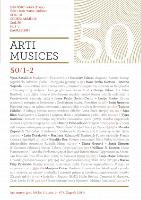
Arti Musices
Innovating Dialogue in Music Research and PracticeArti Musices is a distinguished open-access journal published by the Croatian Musicological Society since 2007, dedicated to advancing the field of musicology and related arts and humanities disciplines. Operating from Zagreb, Croatia, this journal aims to provide a platform for scholarly communication, fostering international dialogue among researchers, musicologists, and practitioners. Although it has a current Scopus ranking in the bottom quartile within its category (Q4 in Music), it offers a unique perspective on the musicological landscape, particularly from a regional standpoint. Researchers seeking to contribute to or glean insights from this evolving field will find that Arti Musices serves an important role in disseminating innovative ideas and empirical research. The journal accepts submissions across a broad spectrum of music-related topics, inviting contributions that reflect the complexities and cultural contexts of music today.

Opus
Advancing Knowledge in MusicologyOpus is an esteemed open-access journal published by the Associação Nacional de Pesquisa e Pós-Graduação em Música in Brazil, focusing on the field of music studies. With an ISSN of 1517-7017, Opus has been dedicated to fostering innovative research since its inception and has embraced the open-access model since 2009, ensuring that its findings are readily accessible to scholars and enthusiasts globally. The journal has achieved a commendable Q2 ranking in Music as of 2023, showcasing its impact and relevance within the arts and humanities. Although currently ranked #130 out of 180 in Scopus in the music category, Opus maintains a commitment to enhancing the scholarly discourse in musicology through empirical studies, theoretical analyses, and interdisciplinary approaches. The journal's convergence over the years, from 2017 to 2024, reflects its dedication to evolving educational and research methodologies in music. Situated in the vibrant academic landscape of Campinas, SP, Brazil, Opus invites researchers, professionals, and students to contribute to its mission of exploring the multifaceted dimensions of music.
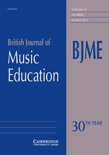
British Journal of Music Education
Advancing the Harmony of Music EducationBritish Journal of Music Education is a prestigious academic publication dedicated to advancing the field of music education. Published by Cambridge University Press, it benefits from a notable impact factor that positions it in the Q2 category in Education and the Q1 category in Music as of 2023. This journal serves as a vital platform for researchers, educators, and students alike, focusing on innovative research, pedagogical studies, and theoretical discussions that shape the practice of music education globally. Since its inception in 1984, the journal has contributed significantly to the understanding of music pedagogy and continues to be relevant and influential, currently spanning the years from 1984 to 1998 and 2007 to 2024. With impressive rankings, including rank #16/180 in Arts and Humanities (Music) and rank #669/1543 in Social Sciences (Education) on Scopus, it highlights the journal's commitment to scholarly excellence. Though it does not currently offer open access, its contributions are an essential resource for anyone involved in the education landscape of music.

Malaysian Journal of Music
Connecting Cultures Through the Language of MusicThe Malaysian Journal of Music is a distinguished academic publication dedicated to the exploration and advancement of music and cultural studies within the Southeast Asian context. Published by UNIV PENDIDIKAN SULTAN IDRIS, FACULTY OF MUSIC & PERFORMING ARTS, this journal contributes significantly to the field by disseminating high-quality research and scholarship related to both traditional and contemporary music practices in Malaysia and beyond. Since its inception in 2018, the journal has earned a Q3 categorization in both Cultural Studies and Music, reflecting its commitment to fostering a comprehensive understanding of these interdisciplinary areas. As of now, it ranks 90th out of 180 in the domain of Arts and Humanities focused on Music, positioning it firmly within the academic discourse. The Malaysian Journal of Music serves as an invaluable resource for researchers, professionals, and students alike, providing insights into the rich tapestry of music, culture, and their societal impacts. The journal is dedicated to open access publishing, ensuring that knowledge is shared widely and freely, further solidifying its role as a cornerstone for music scholarship in Malaysia.